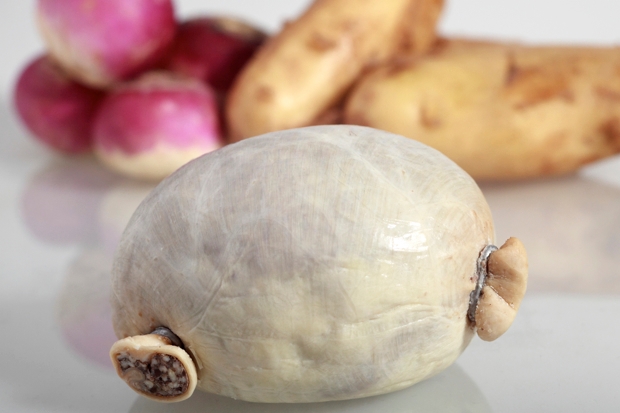Give us this day our daily bread: those are also words of great culinary significance. Even if the ‘bread’ takes different forms — rice, pasta, potatoes — billions of people all over the world are following in that prayer’s footsteps. ‘Staple diet’: throughout history, most people have lived off staples, or died when they ran out.
Staples stimulated cookery. Over time, though it would be fun to try, even daily caviar might pall: daily bread, somewhat sooner. So those who prepared the basics tried to spice them up. If meat or fish were available, there would be no problem, but they are expensive ingredients. Most of those at subsistence level had to make do with herbs and vegetables, plus a little meat or fish for special occasions. Some wonderful dishes were created; think of spaghetti aglio e olio. But most of the enhanced staple dishes that find their way to western tables do so in unrecognisably luxurious versions.
There is a splendid exception: haggis. The one you eat today will be almost identical to the feast that Burns’s rustics would have relished. There might be a touch more pepper in the modern version — too expensive for an 18th-century staple — but the dews still distil like amber bead as the great chieftain o’ the pudding race bursts from its sheep’s stomach.
These days, it could be an artificial sheep’s stomach, which does not compromise the taste. A haggis is primarily composed of oatmeal and sheep juice from the humblest parts of the animal, especially the lungs. The other night, I tried an upgraded version, which included liver and heart. It lacked the warm-reeking, rich pungency of the proper chieftain. It may be that any piece of sheep worth eating on its own would render haggis inauthentic.
In his Boisdale restaurants, Ranald Macdonald of Clanranald, yr, takes care of 3.8 tons of haggis every year (not all to his own gun). We discussed a modern fashion: to sprinkle haggis with a Speyside malt. This has almost become the norm, so that anyone abstaining might be accused of preferring girly-man’s haggis. Not so, we concluded. The tastes clash, and haggis needs no gravy.
Wine is another matter. As we started with smoked fish — the perfect hors d’oeuvre for haggis — we began with a white Ch. Rahoul ’05, which worked beautifully. The less well known white wines of Bordeaux are often unjustly neglected; this is a good example. A blend of Sémillon and Sauvignon Blanc, it has a Graves flinty crispness that complements the fish oils. There followed three very different reds. Although the robustness of haggis might seem to call for the Rhône, or even the New World, we had two clarets and a burgundy.
Both the clarets have a Rothschild provenance. The Légende, Médoc comes from the periphery of Lafite. The intention is to produce a sophisticated Cabernet Sauvignon which will drink early. Judging by the 2010, the vignerons are succeeding. Even so, there is no hurry to finish it.
Then a Benjamin de Rothschild-owned claret, Peyre-Lebade 2007, an Haut-Médoc cru bourgeois, with lots of Merlot and Cabernet Franc. It is benefiting from Rothschild expertise, and Rothschild capital. The tannins were long, but well-integrated with the fruit. The Burgundy was an Auxey-Duresses les Vireux 2010, Domaine Raymond Dupont-Fahn. His parents made superb Meursault: the talent is hereditary. Although I would have bet against a Pinot Noir coming out on top, I thought that he narrowly won the Haggis d’Or.
To pull the threads together, it was time for a dram: Glenfarclas 105, a 60 per cent wild Highland rush of a whisky, which needed some (carefully chaperoned) water to slow it down to tasteability. An outstanding taste: a fast movement fully worthy to end the symphony.






Comments